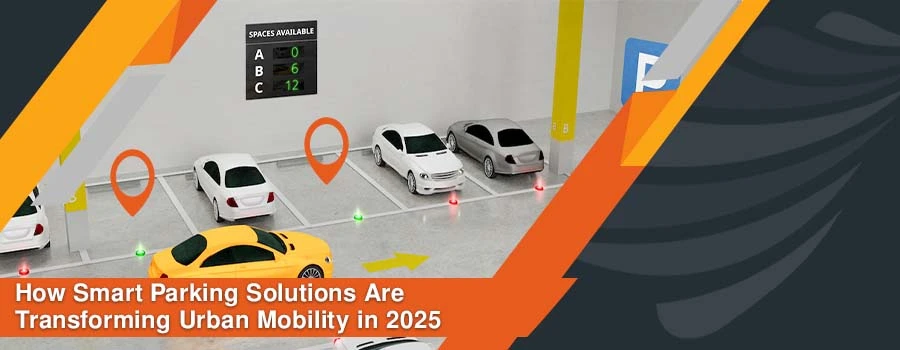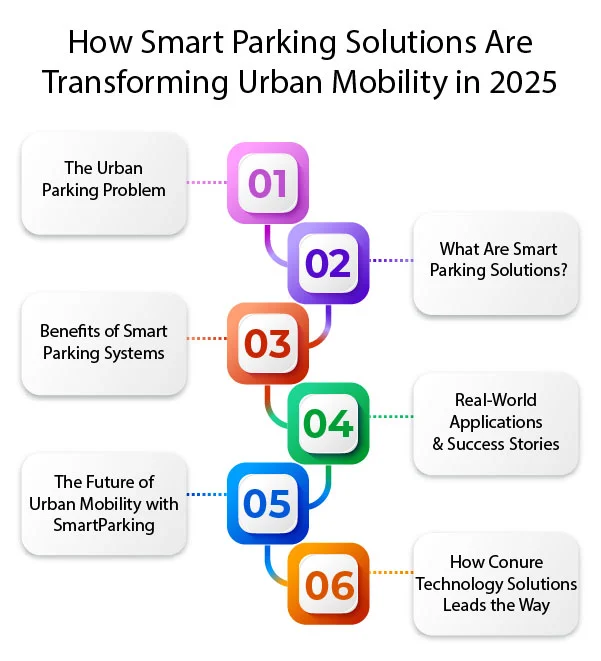As cities continue to grow and evolve, urban mobility has become one of the most pressing challenges for both planners and residents. From daily traffic congestion to the frustrating search for parking, outdated infrastructure often struggles to keep pace with increasing population and vehicle density. These issues not only impact commuters’ quality of life but also contribute to pollution and wasted time on a massive scale.
In response, cities and technology providers are turning to innovative solutions that make transportation more efficient, sustainable, and user-friendly. One such advancement is smart parking — a modern approach that uses real-time data, automation, and connected systems to streamline the parking experience for drivers and city administrators alike.
In this article, we’ll explore how smart parking technologies are reshaping the way we navigate and manage urban spaces in 2025, and what that means for the future of mobility.
The Urban Parking Problem
Finding a parking spot in a busy city has become more than just a minor inconvenience—it’s a daily struggle for many drivers. With more vehicles on the road and limited space in high-demand areas, cities are facing mounting pressure to solve parking inefficiencies that affect traffic flow, local economies, and environmental health.
A significant portion of urban traffic is made up of drivers circling blocks in search of parking. This not only contributes to road congestion but also leads to unnecessary fuel consumption and increased carbon emissions. Traditional parking systems, often reliant on outdated meters or manual enforcement, lack the flexibility and intelligence to adapt to real-time demand.
For city officials and urban planners, managing parking without actionable data leads to missed revenue opportunities and difficulty in enforcing policies effectively. As a result, both the public and city infrastructure bear the cost of inefficient parking management.
What Are Smart Parking Solutions?
Smart parking solutions use a combination of modern technologies to make parking more efficient, accessible, and data-driven. At the heart of these systems are tools like IoT sensors, cloud-based platforms, and mobile applications that work together to provide real-time information about parking availability and usage.
For drivers, this means the ability to quickly locate an open space, reserve it in advance, or even pay through a mobile app without having to fumble for cash or wait in line. On the backend, city administrators gain access to valuable data that helps monitor usage patterns, enforce rules more effectively, and make informed decisions about future infrastructure planning.
There are several types of smart parking systems in use today:
-
On-street parking sensors that detect vehicle presence and share space availability through public dashboards or apps.
-
Off-street solutions in garages and lots that guide drivers to empty spots and manage traffic flow within facilities.
-
Automated payment systems that eliminate the need for traditional meters and streamline the process with mobile integration.
-
AI and computer vision technologies that enhance security, detect violations, and enable license plate recognition for seamless access control.
By combining these technologies, smart parking solutions are turning a historically inefficient system into a smoother, more sustainable part of daily urban life.
Benefits of Smart Parking Systems
Smart parking systems do more than just help drivers find a spot—they deliver wide-ranging benefits that improve urban living, optimize infrastructure, and promote environmental responsibility.
1. For Drivers:
One of the most immediate advantages is the convenience. With real-time updates on available parking spots, drivers spend less time circling the block and more time reaching their destination. Mobile apps enable reservations, contactless payments, and even navigation directly to the space, reducing stress and saving time.
2. For City Planners and Administrators:
City officials gain a powerful tool for better traffic and resource management. Smart parking systems generate data that reveals how spaces are being used, peak usage hours, and problem areas. This insight supports smarter policy decisions, optimized pricing strategies, and more effective enforcement—all while increasing revenue collection through automation and digital payments.
3. For the Environment:
By cutting down the time vehicles spend idling or driving aimlessly in search of parking, smart systems help lower greenhouse gas emissions and fuel consumption. As cities strive to meet sustainability goals, parking innovation plays a crucial role in reducing the carbon footprint of transportation.
Real-World Applications & Success Stories
Around the world, smart parking solutions are already making a measurable difference in how cities operate and how people move through them. By embracing technology, forward-thinking municipalities have successfully reduced congestion, improved user satisfaction, and gained valuable insights for long-term planning.
In major cities like San Francisco, Amsterdam, and Singapore, smart parking infrastructure has been integrated into broader smart city strategies. These systems provide real-time availability updates via mobile apps, dynamic pricing based on demand, and seamless payment experiences—all leading to more efficient traffic flow and better space utilization.
Closer to home, Conure Technology Solutions has contributed to similar innovations by delivering tailored smart parking platforms for clients seeking scalable, high-performance systems. Whether implementing sensor-based monitoring in busy downtown areas or developing cloud-based management tools for parking operators, Conure’s solutions have helped clients modernize outdated infrastructure and meet evolving mobility needs.
These success stories show that smart parking isn’t just a futuristic concept—it’s a practical, proven way to solve everyday challenges in urban environments.
The Future of Urban Mobility with Smart Parking (Beyond 2025)
As cities continue to evolve, smart parking systems are expected to become even more advanced, playing a central role in the broader vision of connected and autonomous urban mobility.
Predictive Parking with AI
Future systems will do more than just show available spaces—they’ll predict where parking will be available based on historical trends, weather, time of day, and local events. This helps drivers plan ahead and reduces unnecessary traffic caused by guesswork.
Integration with Electric Vehicles (EVs)
As electric vehicle adoption rises, smart parking will increasingly integrate EV charging availability into its platforms. Drivers will be able to find a spot that also meets their charging needs, making the transition to electric smoother and more accessible.
Support for Autonomous Vehicles
In the coming years, self-driving cars will need intelligent infrastructure to navigate urban environments. Smart parking systems equipped with machine-readable signage, sensors, and cloud coordination will provide the essential tools for autonomous vehicle docking and drop-off.
Data-Driven City Planning
The data generated from smart parking systems will continue to support smarter urban design. City officials can analyze long-term trends to optimize zoning, reduce traffic congestion, and make infrastructure investments that align with how people actually move through the city.
How Conure Technology Solutions Leads the Way
At Conure Technology Solutions, we believe that smarter infrastructure leads to better cities. Our smart parking platform is built to meet the real-world needs of both urban planners and everyday drivers—offering reliable, scalable, and user-friendly solutions that are ready for today and adaptable for tomorrow.
Our system combines IoT sensors, cloud connectivity, mobile integration, and AI to provide a complete end-to-end parking management solution. From real-time space detection and automated payments to insightful data analytics, we help cities and organizations streamline parking operations and enhance the user experience.
What sets Conure apart is our commitment to customization. We understand that every city and property has unique challenges. That’s why we tailor our solutions to fit the specific needs of our clients—whether it’s a municipal rollout, a university campus, a shopping center, or a corporate facility.
Our team works closely with stakeholders from concept to deployment, ensuring that every implementation meets performance expectations while remaining cost-effective and sustainable. As urban mobility continues to evolve, Conure remains a trusted partner in delivering innovative parking technologies that improve lives and optimize resources.
Conclusion
The future of urban mobility is already unfolding, and smart parking solutions are at the forefront of this transformation. By leveraging advanced technologies such as IoT, AI, and cloud platforms, cities can tackle the growing challenges of congestion, pollution, and inefficient resource use. From improving the daily commute for drivers to offering city planners the data they need to optimize infrastructure, smart parking is a crucial part of creating more sustainable and livable urban environments.
As we look toward 2025 and beyond, the role of smart parking will only grow, becoming more integrated with autonomous vehicles, electric mobility, and data-driven city planning. For cities and businesses ready to embrace the future, the benefits are clear—greater efficiency, reduced environmental impact, and a better quality of life for all.
At Conure Technology Solutions, we are proud to lead the way with our innovative smart parking systems that are built for today’s needs and tomorrow’s opportunities. To learn more about how our solutions can enhance your city or business, get in touch with us for a demo or consultation.
Frequently Asked Questions ( FAQ )
1. What is smart parking, and how does it work?
Smart parking uses technology like sensors, real-time data, and mobile apps to help drivers find available parking spaces quickly. It involves detecting open spots, guiding drivers to them, and providing options for reservations and payment—all in real-time. The system helps reduce the time spent searching for parking, lowering congestion and improving the overall parking experience.
2. How can smart parking benefit cities?
Smart parking offers cities several advantages, such as reduced traffic congestion, improved parking space utilization, and enhanced revenue management. By collecting data on parking patterns, cities can make better decisions about urban planning, ensuring resources are used more efficiently while helping create a more sustainable environment.
3. Can smart parking systems work in busy urban areas?
Yes, smart parking systems are particularly beneficial in high-density urban areas. They help optimize limited space by providing real-time availability information, directing drivers to open spots, and allowing dynamic pricing based on demand. This creates a smoother parking experience and reduces the frustrations often associated with crowded urban parking.
4. Are smart parking systems secure?
Yes, smart parking systems are designed with security in mind. Data encryption, secure payment gateways, and privacy regulations are integrated into the systems to protect users’ information. Additionally, surveillance and AI-powered monitoring can help detect and prevent parking violations or unauthorized access to spaces.
5. How can smart parking improve environmental sustainability?
Smart parking systems reduce the time cars spend driving in search of a parking space, which leads to lower fuel consumption and fewer carbon emissions. By optimizing space usage and encouraging more efficient traffic flow, smart parking can contribute to cleaner, greener cities and help cities meet sustainability goals.
6. Are smart parking solutions expensive to implement?
While the initial setup cost of smart parking systems can vary depending on the size and complexity of the project, many cities find that the long-term benefits, such as increased revenue, reduced congestion, and enhanced efficiency, outweigh the costs. Additionally, ongoing maintenance and management costs are often lower compared to traditional parking systems.
7. How can Conure Technology Solutions help with smart parking?
Conure Technology Solutions offers tailored smart parking systems designed to meet the unique needs of cities, businesses, and property owners. Our platform integrates real-time data, IoT sensors, and AI to provide a seamless and efficient parking experience. Contact us today to learn how we can help optimize your parking solutions.






